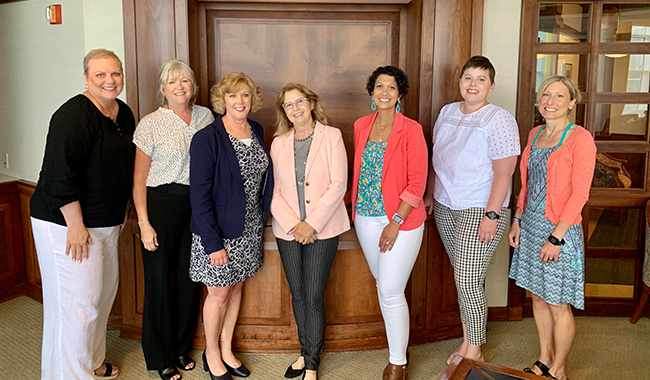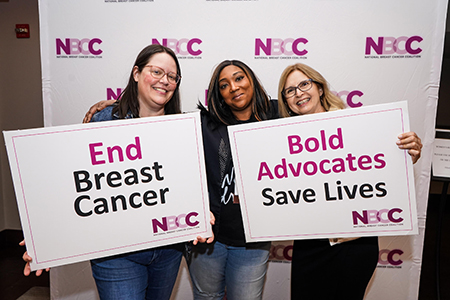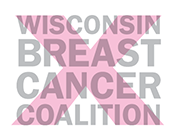WBCC works on multiple fronts to advance our mission to bring Wisconsin voices together to stand up and speak out about breast cancer through legislation, education and collaboration.
Read about some of WBCC’s efforts and accomplishments below:

WBCC is currently working on priorities at the state and federal levels to ensure breast cancer patients can access and afford the care they need in a timely and medically appropriate manner.
At the state level, we are encouraging legislators to support a bill that would require health plans to cover MRI and ultrasound screenings for women who have been diagnosed with dense breast tissue, the same way they cover mammogram screening. Read more about this important bill that would affect nearly half of Wisconsin women here.
At the federal level, we are working with the National Breast Cancer Coalition (NBCC) to pass the Metastatic Breast Cancer Access to Care Act, a bill to waive the 24-month waiting period for Medicare and the five-month waiting period for Social Security Disability Insurance benefits for eligible individuals with Metastatic Breast Cancer. This legislation would waive all waiting periods for Medicare and Social Security Disability Insurance (SSDI) benefits based on disability for individuals with metastatic breast cancer. Read more about this bill here.
WBCC has worked collaboratively on the national level to secure and protect funding for breast cancer research totaling more than $4.5 billion since 1992 through the Department of Defense Breast Cancer Research Program (DoD-BCRP). More than $45 million of that funding has come back to Wisconsin institutions in the form of research grants. We have also worked to promote and protect good, affordable health care that protects breast cancer patients.
WBCC worked to protect access to breast cancer screening and treatment by monitoring changes to the Wisconsin Well Woman Program. WBCC staff completed a survey of all 14 coordinators of the program over the summer of 2017, resulting in a letter of concern to WWWP leaders at the Department of Health Services. Among key problems coordinators identified are significant gaps in coverage, inefficient outreach and improper billing procedures. The program provides free annual screenings and treatment for women between the ages of 45-64. The state drastically downscaled the program in 2015.
Here is a summary of WBCC's advocacy at the state and federal level over the years:
STATE
1996: Secured funding through the Wisconsin Department of Public Health for research into breast cancer “hot spots” in the state
2000: Wisconsin Well Woman Medicaid Program established, enrolling women diagnosed with breast cancer through the Wisconsin Well Woman Program in Medicaid so they could begin treatment immediately
2003: Act 176 - Tax check off box for donations for breast cancer research to the UW Carbone Cancer Center
2003: Act 175 - “Nick’s Law,” a cancer drug repository
2005: Act 194 - “Cancer Patient Protection Act,” insurance coverage of routine care costs while participating in a clinical trial
2007: SB 415 / AB 740 - “Cancer Research Advancement” (failed to pass)
2009: Act 145 - Bans BPA in baby bottles, sippy cups etc.
2013: Act 186 - Oral Chemotherapy Parity, which ensures that oral chemotherapy treatments are covered by insurers the same as IV chemotherapy, not as a pharmaceutical benefit
2013-2014: Wisconsin Well Woman Program - Advocacy surrounding an extreme reduction of the program’s services, without stakeholder input. Extensive advocacy both with the Department of Health Services and legislators, who were not informed of the proposed changes until several months after they were announced to the program coordinators and stakeholders. WBCC was instrumental in getting a one-year delay in the changes and a series of stakeholder meetings with DHS to address concerns.
2022-2025: Breast Cancer Screening and Diagnostics bill - for women with dense breasts and/or at high risk for breast cancer.
FEDERAL

Much of our work on the federal level is done in conjunction with, and as a member organization of, the National Breast Cancer Coalition. As a member, the WBCC is the vehicle to engage Wisconsin citizens in the advocacy process for NBCC’s priorities.
Annually, since 1994: WBCC has engaged advocates to secure and protect funding for the Department of Defense Breast Cancer Research Program. This effort has resulted in over $4.5 billion in funding, with over $45 million of it coming back to Wisconsin institutions for breast cancer research.
1998: Breast and Cervical Cancer Treatment Act - NBCC channeled the outrage that low-income and uninsured women had regarding access to screening but not treatment into a public policy strategy and successful fight for a system of care, thus resulting in the Breast and Cervical Cancer Treatment Act. Thanks to NBCC’s advocacy, it was signed into law in October 2000.
1999: Breast Cancer Environmental Research Act first introduced in the House - This bill called for the creation of a national research strategy and a program to competitively fund collaborations of researchers and community groups to conduct research on environmental factors that may be related to the development of breast cancer. In 2008 the bill was passed, however the version that was enacted into law did not include any of the elements that NBCC developed and had been working on for years and NBCC withdrew its support of the bill.
2011: Introduction of the Accelerating the End of Breast Cancer Act - This bill would have created a national commission to capitalize on federal and private investments already made in science and technology development and develop a plan to accelerate innovation in breast cancer. By 2015, advocates helped gain 274 House and 54 Senate cosponsors for the bill. The bill, which had extensive bipartisan support, fell into the political abyss of inaction and partisan politics and House leadership refused to bring it to the floor for a vote.
2018: Introduction of the Metastatic Breast Cancer Access to Care Act – Advocacy for this legislation is ongoing and is one of the NBCC's and WBCC's top federal priorities.

WBCC has sponsored a yearly Survivor/Advocate Meeting, organized by Policy Committee chair Kathleen Harris, following the Milwaukee Review of the San Antonio Breast Cancer Symposium. For 5 years, Dr. Christopher Chitambar of the Medical College of Wisconsin was present at the meetings to answer questions and clarify the science. These events identified highlights and take-aways from the reviews. No survivor/advocate meeting was held from 2001-2003. In 2024, WBCC resumed the Survivor/Advocate meeting, facilitated by Dr. Kurt Oettel, Director of Gundersen Health System’s Center for Cancer and Blood Disorders.
WBCC co-hosted (with Breast Cancer Recovery) "Education Day: After Treatment, What’s Next?" in September 2024 and will co-host the event again in 2025.
WBCC hosted a virtual education workshop “Healthy Lifestyles After Breast Cancer Diagnosis: Metastatic Cancer Research and Its Application to Daily Life“ in May 2021.
WBCC hosted the virtual symposium “Knowledge is Power” in February 2021, a two-day event featuring discussions of topics centered on advocacy and women of color and breast cancer. The event featured keynote addresses on “Inequities in Breast Care” and “Metastatic Breast Cancer in Communities of Color.” Breakout session topics included breast cancer disparities in Wisconsin’s Hispanic communities, reaching underserved populations, exercise and survivorship, breast cancer advocacy and essential screening for breast density. Oncologist and survivor panel discussions were also featured.
WBCC hosted “Current Ethical Issues for Breast Cancer Advocates” in October 2017, a speaker forum featuring four top scholars: Rebecca Dresser (Washington University), Pilar Ossario (UW-Madison), Diana Fritz-Cates (University of Iowa) and Ryan Spellecy (Medical College of Wisconsin). The event was held at the Zilber School of Public Health in Milwaukee. A 2016 speaker forum on “Obesity and Breast Cancer”, at Columbia St Mary’s Hospital in Milwaukee, featured Amy Trentham-Dietz (UW-Madison Carbone Cancer Center), Lisa Arendt (UW-Madison School of Veterinary Medicine), and Rulla Tamimi, (Harvard University).
WBCC brought its own educational programming, “Breast Cancer and the Environment,” to groups and venues throughout Wisconsin, including the Clean Water Action Council Health Forum in Green Bay, Gilda’s Club in Madison, the YMCA in Oshkosh, Breast Cancer Recovery’s “Sharing the Knowledge” in La Crosse, and Cardinal Stritch University in Milwaukee. WBCC’s free programming also includes presentations on advocacy (“Beyond the Pink Ribbon: Breast Cancer Advocacy 101”).
WBCC distributed its award-winning booklet, “You’ve just been diagnosed with breast cancer. Should you consider a clinical trial?” free to medical settings statewide.
WBCC hosted and sponsored "You Have a Story and We Want to Hear It" in conjunction with the National Breast Cancer Coalition’s "Stop Breast Cancer: Personal Stories, Public Action" in April 2006. The stories written by participants were centered around access to quality of care and demonstrated a very real need for a quality health care system for women with breast cancer every step of the way, from detection through diagnosis and treatment. Numerous Wisconsin breast cancer organizations participated in this event. WBCC joined the efforts of the NBCC and other organizations to advocate for legislation on the federal level for quality of care for all.
In 1996 WBCC took an active role in educating the general public as well as medical professionals on the consumer’s perspective on genetic testing and the importance of patient informed consent for the use of their tissue for research in clinical trials.
“Breast Cancer and Wisconsin’s Environment: What You Don’t Know Could Harm You,” a project of WBCC, was held in October 1995. Nationally recognized experts on breast cancer were recruited to participate as speakers. WBCC was instrumental in focusing attention on breast cancer as a public health issue.
WBCC leaders are community partners with researchers through the Breast Cancer Research Advisory Network based at the UW-Madison Carbone Cancer Center. WBCC also was a Community Partner of The Breast Cancer and the Environmental Research Program (BCERP) from 2010-2015.
As a partner of the Wisconsin Cancer Collaborative (formerly the Wisconsin Comprehensive Cancer Control Program), WBCC volunteers participated in the creation of the WI Comprehensive Control Plans for 2005-2010, 2010-2015 and 2015-2020, and are currently working to implement strategies outlined to achieve goals for the plan.
WBCC staff actively participated on the Wisconsin Cancer Council’s Policy Committee to coordinate policy watch efforts on the state level, with the Wisconsin Breast Cancer Task Force’s Coalitions in Action Team on its hugely successful Sister Pact campaign to address breast cancer mortality disparities for African-American neighborhoods in Milwaukee, and with the National Breast Cancer Coalition, to protect quality health care for survivors and all Americans.
